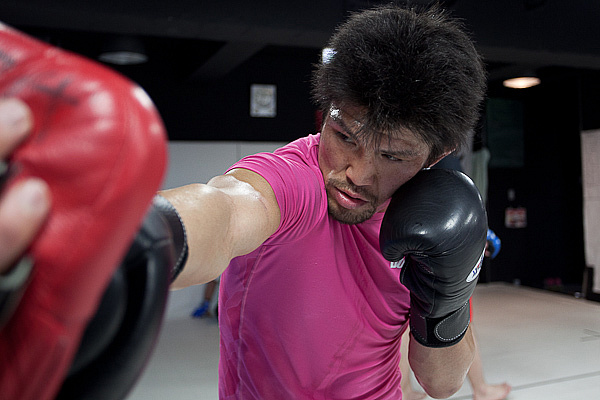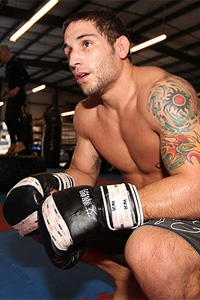Omigawa’s Holy Homework
Holy Homework
Tony Loiseleur Feb 2, 2011

Michihiro Omigawa | Taro Irei/Sherdog.com
TOKYO -- “It doesn’t feel like I should say finally, but finally, I’m back in the UFC,” says a quiet, gravelly voiced Michihiro Omigawa between sips of coffee.
In a knit headband and wool pullover, Omigawa leans back in his booth at a café near the J-Rock Workout Studio. The only other inhabitants are senior citizens, garrulously chatting the morning away while one of their country’s best fighters quietly prepares for the day’s training. The scene is quiet and anonymous, and it suits the deadly serious Omigawa.
Advertisement
Omigawa is a man of few words; his only moments of voice-raised verbosity are in his infamous -- and often profane -- post-fight speeches. If he were an actor, it would be accurate to call his performances taut or restrained. Nonetheless, the relief in Omigawa’s voice is palpable. While some fighters go only as far as exclaiming the platitude of how honored they are to fight in the UFC, Omigawa is one of the few Japanese fighters who had the benefit of having been there, only to finally return.
“Somehow, I feel like there’s this strong bond between myself and
the UFC. I’m really happy that I’m able to come back. Maybe it is
God telling me that I have to return to the UFC, and that’s why I’m
able to go back now,” he says.
Omigawa’s first UFC stint three years ago was brief, as he was cut after losing tough decisions to Matt Wiman and Thiago Tavares. The pairings were demanding, considering Omigawa entered the Octagon with a .500 record, a clear beneficiary of the fallout from Zuffa’s purchase of Pride Fighting Championships and his place within the Yoshida Dojo stable.
However, those challenges were not new for Omigawa. He debuted in the Pride ring of all places against gritty veteran Aaron Riley, who wielded eight years of MMA experience and nearly three dozen fights. His second fight came against a 7-1-1 Gesias “JZ” Cavalcante; he lasted just 49 seconds.

Dave Mandel
Omigawa says he holds the advantage in
his matchup with Chad Mendes (above).
“Being ‘cut by the UFC’ sounds negative, but all the experiences I’ve had in other rings since are positive. I’ve learned and grown a lot. Before my return to the UFC, I was finally able to refine my ‘Omigawa style,’” the Hidehiko Yoshida understudy says. “Specifically, it’s a synthesis of judo and striking. It’s taken time to hone, and it’s nearly perfect these days.”
Amidst turmoil of a deteriorating fight industry in Japan, it comes as no surprise that fighters like Omigawa are looking abroad to test their mettle and get paid. However, despite having notched wins -- albeit highly contentious ones -- against the likes of major featherweight titleholders in Japan, such as Sengoku featherweight champion Hatsu Hioki, Dream featherweight titleholder Hiroyuki Takaya and former Sengoku featherweight kingpin Marlon Sandro, Omigawa has opted to return to the UFC rather than capture a belt at home.
According to Omigawa, he was never in title consideration, either. After his management company, J-Rock, effectively ended its relationship with Sengoku Raiden Championship, Omigawa turned in a first-round stoppage against Takaya on New Year’s Eve in 2009. Heading into 2010, the win over Takaya fueled speculation that he would challenge for the title on Dec. 31.
“I didn’t know anything about a Dream title match [at Dynamite], and no one was talking to me about one. I felt so isolated from Dream then. I was thinking, ‘Oh well, if that’s how it is, go ahead, I guess.’ I felt left out,” says Omigawa, recalling the Takaya-Bibiano Fernandes title fight Dynamite announcement with a wry smile.
“I remember saying publically at the beginning of 2010 that I desperately wanted the Dream featherweight title, but things went wrong, and I didn’t get an opportunity to fight Fernandes. I didn’t like that,” he laments.
However, Omigawa has taken this rejection slight as a sign of a greater purpose. While former adversaries like Hioki, Takaya and Sandro have excelled in Japan, Omigawa feels his opportunity to outshine them will come beyond the shores of his homeland.
“All three have belts because they’re so strong. All except me, however,” Omigawa says quietly. “I think the reason for that is because I have something to do outside of Japan. It’s like God has given me a task to accomplish, like I’m being told, ‘You’re not for here. You must go beyond Japan.’
“Just before the Takaya-Fernandes title bout was confirmed, the WEC and UFC merged,” he continues in hushed tones. “Since the timing was so perfect, I felt maybe this merger was happening for me. I always said I wanted to reach the top of the featherweight division, and I think it’s in the UFC now.”
Despite speaking softly, there is no doubting Omigawa’s conviction in this belief. He is not particularly religious, but he truly believes something deeper or greater is orienting him toward the UFC.
“
I don’t think he’s
much of an MMA
fighter. He’s not
going to try to
finish an opponent. I
think I’m the one with
the advantage here.
”
Omigawa’s spirituality sans religiosity is typical in Japan. Though the animist Shinto is the state religion and Buddhist temples abound, the majority of modern Japanese tend to be syncretic or atheistic. Christianity and the notion of a monotheistic, all-powerful god is thus something with which many Japanese like Omigawa are familiar and appropriate in their everyday lives in a distinctly secular way.
Fate and destiny notwithstanding, the undefeated Mendes has the kind of stellar wrestling and suffocating top game that can frustrate and shut down anyone’s offense. Omigawa, however, is unperturbed by the stylistic challenge.
“I don’t think he’s much of an MMA fighter. He’s not going to try to finish an opponent. I think I’m the one with the advantage here,” Omigawa says matter-of-factly.
Continue Reading » Acclimating to America
Related Articles







